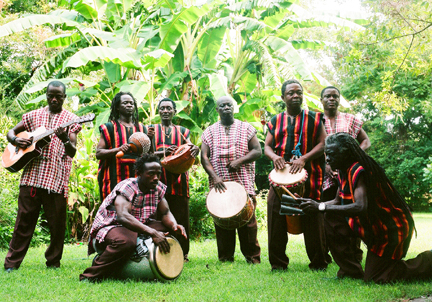
Photo by Zach Smith
Bob Marley penned the lyric, “One good thing about music, when it hits you feel no pain.”
This line of creative brilliance rings true for the people of Sierra Leone. During the 1990s, the West African country of Sierra Leone was decimated by war, forcing millions to flee their homes. The majority of people fled to neighboring Guinea, eventually ending up in refugee camps.
At the refugee camps, musicians banded together and began to entertain their fellow brothers and sisters. Word spread and a Canadian relief agency donated two beat up electric guitars, and a single microphone. American filmmakers Zach Niles and Banker White took notice and were inspired by their story and ended up filming them for three years as they moved from camp to camp.
In 2006, the musicians returned to their home capital of Freetown as the Sierra Leone Refugee All-Stars with a debut album: Living Like A Refugee. Currently, the Sierra Leone Refugee All-Stars are touring in support of their brand-new record Radio Salone, which features more of a retro sound. The current lineup of the band consists of Reuben Koroma (vocals), Black Nature (vocals, congas), Ashade Pearce (lead guitar), Jahson Bull (keyboards, rhythm guitar), Dennis Sannoh (bass) and Christopher Davies (drums).
Jambands.com spoke with the senior member of the band, Reuben Koroma.
Take me back to the refugee camp and the decision to play music at that moment in time?
In the refugee camp, I played music because I wanted to reform my life. I was highly frustrated being separated from my country, my usual contacts, my siblings and everything. Instead of thinking about what happened to me, I thought that I had to do something to heal myself. That was the main reason why I decided to play music.
What type of jobs did most of you have earlier in your lives?
I was playing music full-time before the war separated us. I was playing in a band called The Emperors. When the war broke out, I fled but some of the band members remained there. So the band broke up. Christopher, our drummer, works at the Immigration office in Sierra Leone. The rest of us have been musicians for a long time.
Before the Canadian Relief Agency donated instruments, what did you use?
We used only one acoustic guitar, and improvised percussion on empty oil containers, two hubcaps for a high hat, and x-ray cards as a drum. And the voices.
Did you sense any special magic or vibe when you guys started playing in the camps?
Before the war, I played music for my living, to support my family. When I was playing music in the refugee camp, I was playing to make myself feel happy. We didn’t get paid, we just played for happiness. It was only when we gained recognition in the camp that we were hired to play by the relief organizations.
What did it mean to you personally to provide so much joy to your fellow refugees during that 8-year period?
I was doing something for my people because they needed help at that point in time. I felt that I was saving them from their situation.
Do you still get that same joy today playing for live playing audience across the world?
Yes. I still have that joy because it’s something that has grown in me. Seeing people smile, jump, and dance is a very great pleasure to me.
What was it like for the band when you returned to Freetown?
When we returned, we had already recorded our first album Living Like A Refugee. It was something that I could survive on. I hoped that we could take care of ourselves through album sales. And also, for me to be reunited with my old friends and siblings, it was a powerful reunion. I felt at home after a long time in exile.


No Comments comments associated with this post